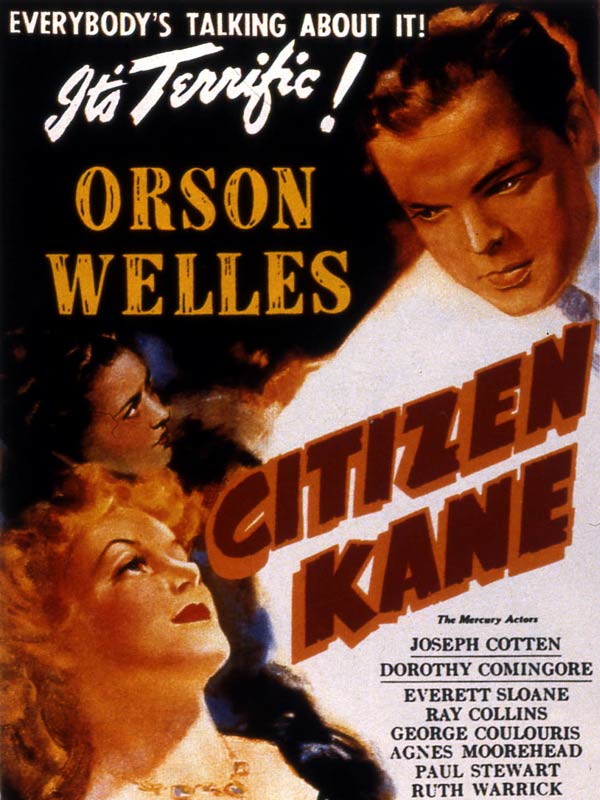In 1941 writer, director, and actor Orson Welles redefined filmmaking with his classic picture Citizen Kane. There are only a very few directors who received any notoriety from their freshmen attempts at the time of their release. Orson Welles had made a name for himself on the stage and, a few years before Kane was released, his recitation of H.G. Wells’ War of the Worlds had a peculiar effect in several areas of the country. It was this, and other parts of his relationship with RKO Productions, that granted Welles with complete control over the production of Citizen Kane.
If you take a small sample of pictures made recently before, and the same amount made after, a viewer can see the effect that Kane had on the industry. Most of this can be attributed to either his naiveté or his genius vision. As a novice, Welles was not very well educated on the techniques of film making and, in a sense, made it up as he was going alone. It was this that created the unique camera angles and lighting templates that would soon be infecting the rest of the motion picture industry.
Looking beyond that, beyond the camera angles that made Herman Melvile Kane into the larger-than-life persona, you can see a story that, with any luck, the super-wealthy of the modern world could use as a teaching moment. Kane was given a substantial fortune of inexhaustible wealth that he wanted to use for the betterment of the world. That is the ruby spectacles version of it, at least. Kane was a deeply flawed man who had struggles that his wealth could not solve.
A particularly interesting method that Welles employed was circular storytelling, Kane dies very early in the picture, dropping a snow globe and muttering, “Rosebud.” I have sincere doubts that the film would have worked quite as well as it had if a linear approach was employed. This, I think, is the lesson.
It is my understanding that, in storytelling, there are many situations in which the creator does not always have the complete control that they desire. The looming neck of an editor plays an integral part in the production of many pieces of art, especially if you are hired to tell their story, or use their property. Sometime editorial interference can be valuable; while you may have told the story exactly how you think it should be told, there is a strong chance that something will not work for readers. This will force the creator to, in some cases, bend their creation for the sake of others’ abilities to understand.
On the other side of this coin, the writer can hold firm to their initial vision, and sometimes, as Citizen Kane and attest, this decision may be lightning in a bottle and change the way that people consume a medium. I fear that this is rarely the case and those thoughts and opinions may leave the finished product better off with the changes. Sometimes it also ends in a media war that can have a lasting effect on the creator. Terry Gilliam and Francis Ford Coppola both come to mind on either side of this. Gilliam fights, tooth and nail, to keep his films the way that he believes they should be and this had a tremendous ill-effect on his career as he would typically get his way but it came at the cost of a studio’s willingness to work with him.
Coppola, on the other hand, spent every day on the set of The Godfather waiting for the other shoe to drop, but he kept plugging along, finished filming with the ever-present warm breath of the studio and went off the edit fully knowing that he had the impossible task of forming the entire film into a relatively short running time. So he did just that; he conformed to what he was told and turned in a slightly longer picture than ordered. When the studio executives finished their viewing, they made Coppola put much of what was cut back into the picture, giving it a longer running time and giving Coppola the story that he initially wanted to tell.
What is the right answer to this? I don’t know. As a writer you make what you want. That is the whole point – to tell the story that you need to tell. If others tell you to change something that they believe will be of benefit to the story, it is up to you to change it as you will. You need to be prepared to be wrong, though, or be prepared to stick to your guns. That is was what Welles did, and it worked. Lightning in a bottle.
I watched the recent Blu-ray edition of the film and it looked good. It had been a very long time since the last time that I had a viewing and I do not remember the formatting so I cannot comment on the specific transfer. Again, though, it was a quality presentation.
Trailer
Important Links


